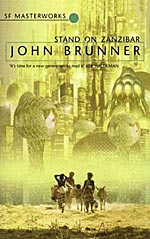
![]() Sable Aradia
Sable Aradia
11/29/2016
![]()
Read for the SF Masterworks Reading Challenge, the 12 Awards in 12 Months Challenge, and the Science Fiction Masterworks Book Club.
The plot synopsis posted for this book is misleading. It implies that this is a proto-cyberpunk tale of the evils of big corporations. It's not. But the plot is rather complex so it probably works as well as anything else as a plot description. It's not really about a plot, anyway; it's more about the theme.
Overpopulation was a big concern for sci-fi writers in the 70s. They were concerned at the rapid birth rate and that we would be the cause of our own extinction as we overtaxed the world's resources. The classic sci-fi movie "Soylent Green" was produced during this time, based on an award-winning short story called "Make Room, Make Room!" Fortunately, two factors seem to have thus far rescued us from this fate (but perhaps not forever, as we continue to inflame climate change): 1) modern agricultural technology (which often treats animals immorally and has done terrible things to engineered crops, not the least of which is the creation of inert seed, which I believe should be outlawed across the planet, but which has considerably maximized food production); 2) in urban environments humans have less babies because there is less advantage in it, and so the birth rate declines as the world urbanizes.
The two focal protagonists, roommates Norman House (rising star business executive in an ultra-megacorporation) and Donald Hogan (sleeper spy "synthesist" for the U.S. government) are trying to get along in this overcrowded world of the future. Most governments have imposed eugenics laws in an attempt to control population, and have forbidden breeding rights to an increasingly large group of people, justified by an ever-broadening laundry list of "genetic flaws" (colour-blindness having been one of the most recently adopted.) In the meantime, the tension of living in such close quarters is so high that people are running around on a hair trigger. "Muckers" (people running amok) are a routine danger, losing it for minor trigger reasons and going on a killing spree or blowing things up or committing serial rape. This "rat theory" (humans too crowded will kill each other like rats in a cage) has been generally disproven; but you have to use the space in such a way that it creates peace of mind, so tenement slums will likely produce overcrowded tensions, but megabuildings with a built-in park and shopping mall probably won't.
Except, this is not happening in a small African nation called Beninia, where everyone, even though they're living in crushing poverty and overcrowding, gets along and lives in peace. All attempts to invade them or take them as slaves have failed as the people attempting to do so just gave up. And one of their scientists has just announced a process that can genetically select to prevent all such flaws; which would completely topple the existing social order. The US send Donald to stop it, and Norman's company send him to figure out a way to make a profit on it. In the meantime a near-sentient computer created by Norman's company attempts to calculate all of this.
Brunner interrupts his narrative to show us media slices and slices of the lives of other people affected by this world. Many have described it as an experimental novel. Maybe it was at the time. To me, I was reminded of Frederic Pohl's Gateway, which included slices of the local messages and advertising in his space "gold rush" town, and it didn't throw me like it seems to have thrown others.
I think this novel was a lot of fun to read. I didn't like it at first but it grew on me, probably because it wasn't what I was expecting. Also, I think it has a lot to say to us in the modern time. Because of the overcrowding a vast income inequality opened up; the rich did better in this story than the poor and had to deal with less negative conditions (and that remains true because of the way in which comparative spaces are utilized for the rich and for the poor). Also, people were looking for an excuse to dislike each other and would categorize people according to any perceived difference, from race to national origin to eye colour. Perhaps this explains current politics.
Also, this novel, though in many ways it feels dated, might be one of the ways you could introduce a non-sci-fi friend to science fiction. Atwood fans might call this "speculative fiction" because the science isn't really that far-fetched or that far in the future, and they would probably read it for the same reasons.